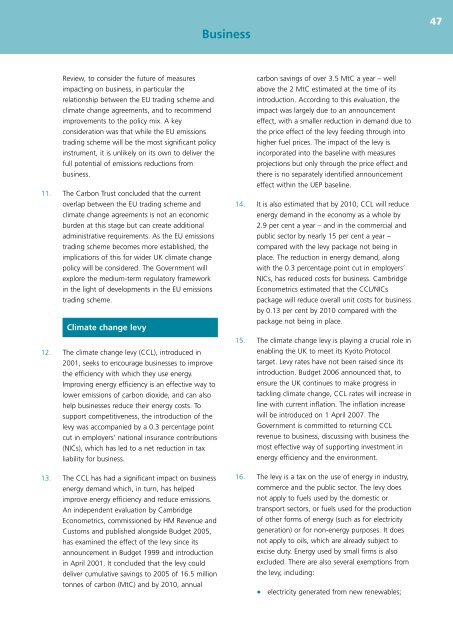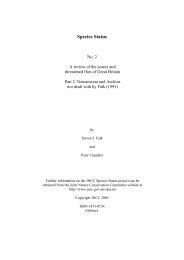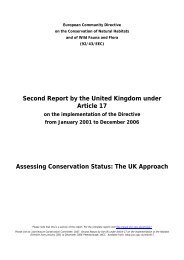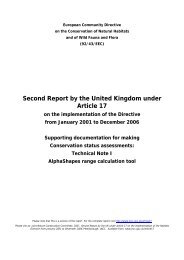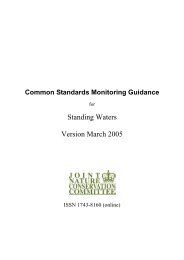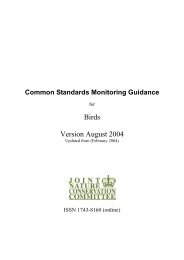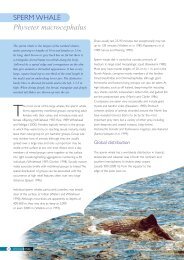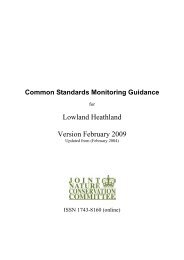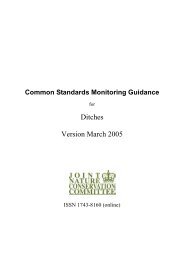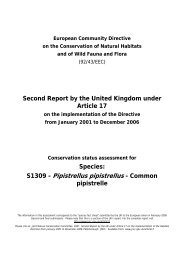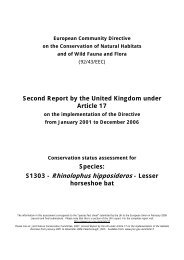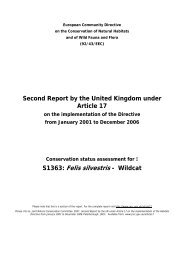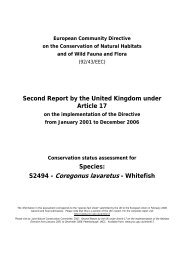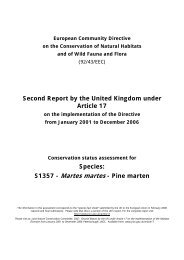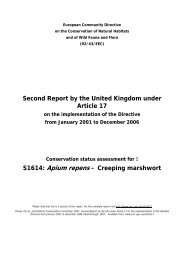UK Climate Change Programme 2006 - JNCC - Defra
UK Climate Change Programme 2006 - JNCC - Defra
UK Climate Change Programme 2006 - JNCC - Defra
You also want an ePaper? Increase the reach of your titles
YUMPU automatically turns print PDFs into web optimized ePapers that Google loves.
Business<br />
47<br />
Review, to consider the future of measures<br />
impacting on business, in particular the<br />
relationship between the EU trading scheme and<br />
climate change agreements, and to recommend<br />
improvements to the policy mix. A key<br />
consideration was that while the EU emissions<br />
trading scheme will be the most significant policy<br />
instrument, it is unlikely on its own to deliver the<br />
full potential of emissions reductions from<br />
business.<br />
11. The Carbon Trust concluded that the current<br />
overlap between the EU trading scheme and<br />
climate change agreements is not an economic<br />
burden at this stage but can create additional<br />
administrative requirements. As the EU emissions<br />
trading scheme becomes more established, the<br />
implications of this for wider <strong>UK</strong> climate change<br />
policy will be considered. The Government will<br />
explore the medium-term regulatory framework<br />
in the light of developments in the EU emissions<br />
trading scheme.<br />
<strong>Climate</strong> change levy<br />
12. The climate change levy (CCL), introduced in<br />
2001, seeks to encourage businesses to improve<br />
the efficiency with which they use energy.<br />
Improving energy efficiency is an effective way to<br />
lower emissions of carbon dioxide, and can also<br />
help businesses reduce their energy costs. To<br />
support competitiveness, the introduction of the<br />
levy was accompanied by a 0.3 percentage point<br />
cut in employers’ national insurance contributions<br />
(NICs), which has led to a net reduction in tax<br />
liability for business.<br />
13. The CCL has had a significant impact on business<br />
energy demand which, in turn, has helped<br />
improve energy efficiency and reduce emissions.<br />
An independent evaluation by Cambridge<br />
Econometrics, commissioned by HM Revenue and<br />
Customs and published alongside Budget 2005,<br />
has examined the effect of the levy since its<br />
announcement in Budget 1999 and introduction<br />
in April 2001. It concluded that the levy could<br />
deliver cumulative savings to 2005 of 16.5 million<br />
tonnes of carbon (MtC) and by 2010, annual<br />
carbon savings of over 3.5 MtC a year – well<br />
above the 2 MtC estimated at the time of its<br />
introduction. According to this evaluation, the<br />
impact was largely due to an announcement<br />
effect, with a smaller reduction in demand due to<br />
the price effect of the levy feeding through into<br />
higher fuel prices. The impact of the levy is<br />
incorporated into the baseline with measures<br />
projections but only through the price effect and<br />
there is no separately identified announcement<br />
effect within the UEP baseline.<br />
14. It is also estimated that by 2010, CCL will reduce<br />
energy demand in the economy as a whole by<br />
2.9 per cent a year – and in the commercial and<br />
public sector by nearly 15 per cent a year –<br />
compared with the levy package not being in<br />
place. The reduction in energy demand, along<br />
with the 0.3 percentage point cut in employers’<br />
NICs, has reduced costs for business. Cambridge<br />
Econometrics estimated that the CCL/NICs<br />
package will reduce overall unit costs for business<br />
by 0.13 per cent by 2010 compared with the<br />
package not being in place.<br />
15. The climate change levy is playing a crucial role in<br />
enabling the <strong>UK</strong> to meet its Kyoto Protocol<br />
target. Levy rates have not been raised since its<br />
introduction. Budget <strong>2006</strong> announced that, to<br />
ensure the <strong>UK</strong> continues to make progress in<br />
tackling climate change, CCL rates will increase in<br />
line with current inflation. The inflation increase<br />
will be introduced on 1 April 2007. The<br />
Government is committed to returning CCL<br />
revenue to business, discussing with business the<br />
most effective way of supporting investment in<br />
energy efficiency and the environment.<br />
16. The levy is a tax on the use of energy in industry,<br />
commerce and the public sector. The levy does<br />
not apply to fuels used by the domestic or<br />
transport sectors, or fuels used for the production<br />
of other forms of energy (such as for electricity<br />
generation) or for non-energy purposes. It does<br />
not apply to oils, which are already subject to<br />
excise duty. Energy used by small firms is also<br />
excluded. There are also several exemptions from<br />
the levy, including:<br />
• electricity generated from new renewables;


